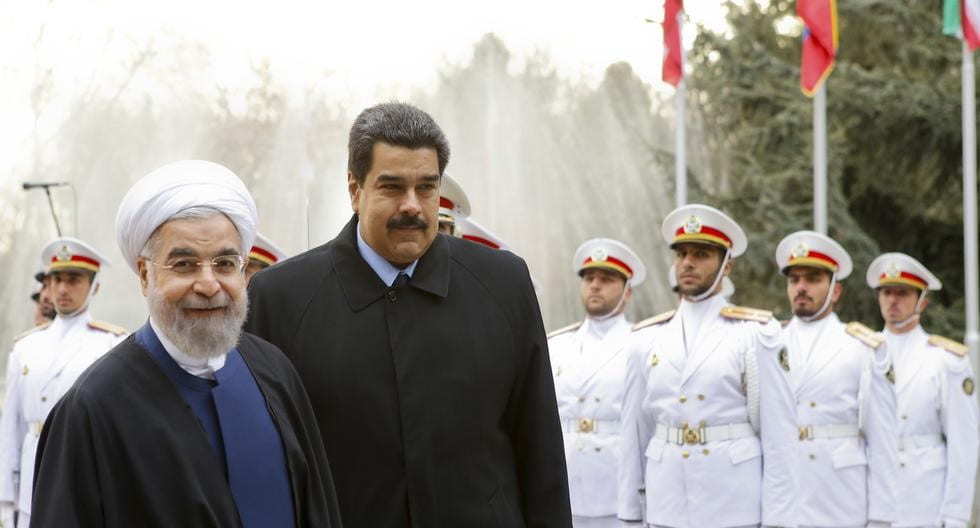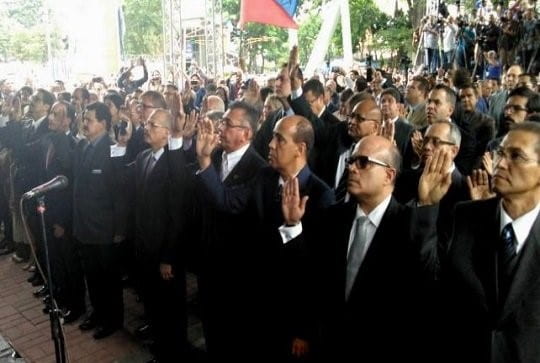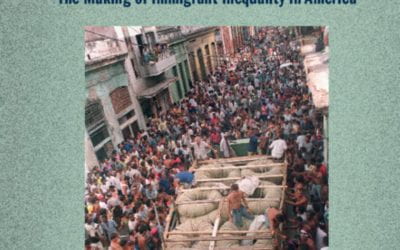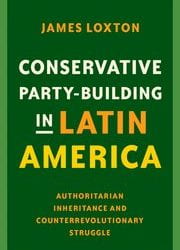Online Justice in a Pandemic
Between Rights and Reality
Photos courtesy of Luis Manuel del Valle Marcano Salazar
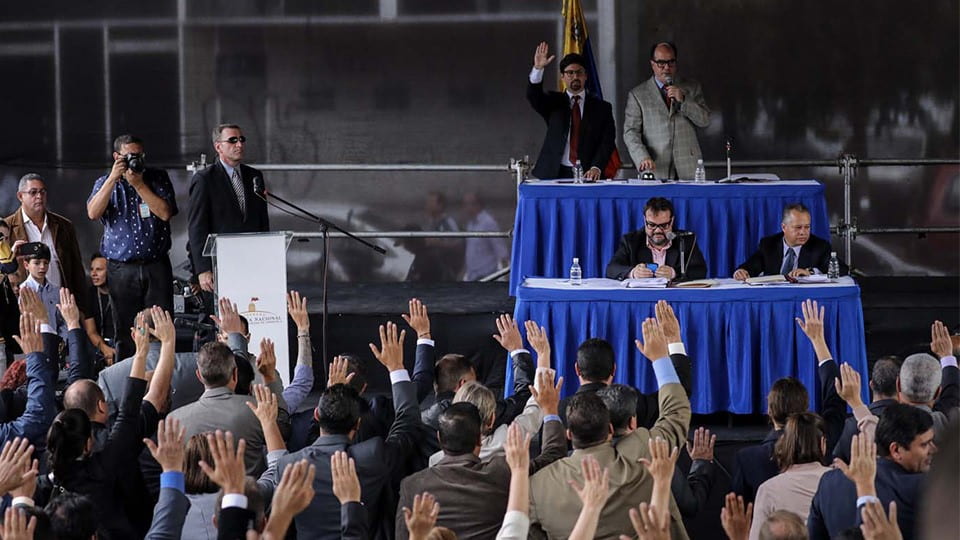
Swearing in of the Supreme Court of Justice at the Plaza Alfredo Sadel because the repressive forces of the government prevented them from reaching the National Assembly. Therefore, the legislative body that was going to swear them in performed the ceremony in a crowded plaza.
Gustav Radbruck, a 20th-century German legal scholar and politician, lived through a time of revolutions, wars and fundamental changes in the perception of law and justice. After two stints as Minister of Justice during the Weimar Republic, he became professor of law and legal philosophy at Heidelberg. When the Nazis seized power in 1933, Radbruck was expelled from his teaching. Legal scholarship owes to him the well-known Radbruck formula, a theory of law first put forth in 1946 in an essay he authored. In short, a legal norm without an etical content that feeds its structure is not law and has no place in the legal world. Since the end of World War II, decisions of federal courts in Germany numerous times have been rooted in Radbruck’s theory, erasing the legal norms of morality from the fabric of humanity. Thanks to the Nuremberg trials of 1946, a dividing milestone was established between a past of wars regulated by law and a future of deep tensions between politics and law immersed in a dense revision of legal-political theory and philosophy that attempts to make the world more just and humane.
Similar to the times of Radbruck, law and justice are currently facing new challenges after the attack of the Covid-19 on humanity at the same time as the emergence of authoritarian-competitive regimes. Failed democracies have turned into tyrannies in a post-democratic and populist context in Latin America with developmental aspirations. Indeed, on the one hand, there is the threat of tyrannies such as that of Nicolás Maduro and the threat against the democratic dialectic in El Salvador, and on the other, the onslaught of Covid-19 on the crisis of displaced persons and migrants. All have exacerbated tensions in legal reflection on sovereignty and freedom.
Between Online Jurisdiction, Covid-19 and Other Political and Human Evils
Before the Covid-19 onslaught on world capitalism, personal freedoms and the daily life of Latin Americans, these had already been attacked by the neototalitarianism of Nicolás Maduro, causing one of the greatest humanitarian crises that Latin America has known in its contemporary history. However, the fight for the freedom of Venezuela waged in the streets, universities, and political forums took on a new dimension in late 2017 when the 30 magistrates, all judges of the Supreme Court of Justice of Venezuela, duly appointed and sworn into office by the legislature, had to flee their home country as a result of the arrest warrant issued by Nicolás Maduro himself. They had to find refuge and secure exile in four countries: the United States, Panama, Colombia and Chile.
The Maduro regime hoped that persecuting these justices would eliminate the danger of having a united Supreme Court that could have removed him from power. Despite their separation and ultimately physical distance, these magistrates capitalized on their Right to Jurisdiction and, based on the Nuremberg principles, the Universal Jurisdiction principle, and the Princeton principles, all monumental theoretical and philosophical supports for the defense of human rights. They managed, with the support of the Organization of American States, to constitute the Supreme Court of Justice in exile, relying for the first time on the cybernetic tools of distance communication. The synchronous dimension of the meetings of each Chamber of the Supreme Court and the plenary sessions have led to a dynamic work that has produced over three years more than 15 sentences. Among these proceedings was the trial against Nicolás Maduro for embezzlement of public funds which resulted in a sentence of up to 18 years in prison and a fine of a significant amount of money that must be returned to the national patrimony. He also was ordered to create a humanitarian channel to mitigate the serious human ailments experienced by Venezuelans and exacerbated by Covid-19, as evidenced by his deep disrespect for human beings.
The social and political context in which the Court of Justice [online] began to function paralleled the hardening of Venezuelan neototalitarianism, surrounded by a decline in values of politics and leaders, which generated a weakening of the social struggle. Only, when Juan Guaidó came onto the public stage did society manage to rescue the spirit of struggle that had been previously diminished by the effects of Covid-19 on humanity that brought world capitalism to its knees while empowering tyrannies to greatly restrict freedom and social control. In this arena, the cybernetic communication channels, strengthened by the experience developed in the Zoom platform, shortened the distance and strengthened the fight against Covid-19 not only in the medical context but also from the legal and political perspective.
From the beginning, Covid-19 became one of the most dangerous evils that humanity has experienced in the last 60 years. In only a few months, it brought capitalism to its knees by ambushing the market economy and the employment of many people. The economy was quickly able to adapt to the times of virtuality, but the power to exercise their sovereignty, a socio-legal control and restrictive interpretation of the principles of freedom and defense of human rights remained in the nation-states.
The Supreme Court of Venezuela in exile adopted those fundamental principles of the defense of human rights with the authority of the Radbruck Formula, which provides that a decision—legal metalanguage—is not endowed with moral principles and human rights, and it cannot be considered a sentence that arises from a judicial body that administers justice but rather a political decision that has hijacked the spaces of administration and interpretation of the law. In Venezuela currently, there is a headless judicial structure of all criteria that is an expression of the common good, justice and legal security. The Supreme Court of Justice in exile is a forceful response against authoritarianism and in defense of democracy.
Virtual Jurisdiction versus the Double Triangle
At critical moments for humanity because of Covid-19, the threat against international security is represented by the economic-military triangle (Beijing-Tehran-Moscow) that assists the triangle of repression (Caracas-Managua-Havana) looming over the region. In short, this repression, taking advantage of the limitations to freedom and social control, seeks to plan and develop in Latin American democracies what French philosopher Félix Guattari in 2017 called a dissipated molecular revolution, based on producing chaos and deconstruction of the socio-political-economic model through the derailment of public institutions attacked by organized groups which then dissipate among society.
The truth is that the erratic social public policies implemented by some Latin American nations increased the effects of the humanitarian crisis as a consequence of the impact of the pandemic on labor relations—particularly of the working class of migrants, who were thrown into shelters as a result of the massive layoffs. The resulting domino effect caused the economy to shut down and prolonged quarantines as well as the limitation of civil rights. In Chile, for example, the government of Sebastián Piñera promulgated an immigration law that not only denied the inclusion of the neediest but also developed policies of massive deportations of Venezuelans who had entered the national territory illegally. Although it is true that the sovereignty of national states justifies the implementation of any type of internal or external public policy, the special situation as a consequence of the international health emergency deserved much more consideration for humanitarian reasons in safeguarding the human rights of the displaced and migrants.
On the other hand, the so-called “Bolivarian breeze,” an expression coined in 2019 by Maduro’s second-in-command Diosdado Cabello, is witnessed in the symmetrical protests in Chile, Ecuador, Peru and Colombia. In my opinion, they constitute the application of the so-called dissipated molecular revolution whose objective has been to dismantle the prevailing democratic social system and to install a new totalitarian model causing destruction, looting, fires, violations of private property, consisting of mobilizations and rapid demobilizations conducted from Caracas and Havana to destabilize governments and challenge authority in the streets. Faced with this situation, the Supreme Court of Justice of Venezuela in exile will propose to promote an American Convention on Humanitarian Intervention within the United Nations to put an end to the prolonged crisis that threatens to cause greater damage.
Another of the most visible effects of the pandemic has been the paralysis of everything. In Venezuela, the movement in the streets demanding freedom and free elections and subsequent effective fighting against the forces of the dictatorship were stopped. Covid-19 not only confined citizens to legitimized and legalized prisons, thus forcing the majority of the population to limit its sense of freedom, but also created an immoral opportunity for tyrannies and post-democratic regimes to further restrict rights and increase social control.
Our recent history has been written from Havana, Tehran and Moscow. Venezuelans have lost the power to self-determine their destiny. Venezuela is a hijacked state desperately in need of rescue.
As a Supreme Court in exile, we have become one of the main allies that the American people have to counter what is happening in Venezuela and Latin America. By way of our denunciations and alerts, awareness of the dangers that threaten the internal security of the United States and as well as the sense of justice and democracy are heightened. International morality is being challenged by the big drug cartels. The U.S. Federal Courts have already made requests and requirements against Maduro and his accomplices, but are they enough? The executive action of the current federal government must be based on how to distinguish between law and politics and to execute a rapid capture action for the peace of the region and democracy.
Finally, Covid-19 has become a tough test for humanity, not only from the health point of view, but also from the views that society makes of the prevailing political order at the level of the United Nations System, whose reforms are part of a pending agenda and from each domestic context that has sought to survive and defend its status quo, in the face of social demands for freedom, justice and defense of human rights.
Justicia online en una pandemia, entre derechos y realidad
El caso del tribunal supremo en el exilio
Por Luis Manuel del Valle Marcano Salazar
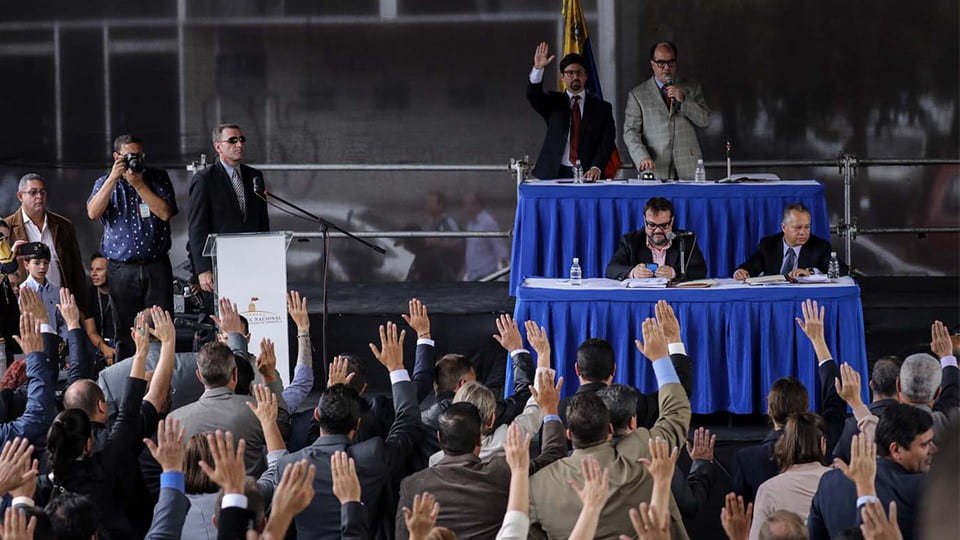
Juramentación en la Plaza Alfredo Sadel del Corte Suprema de Justicia, toda vez que no pudieron llegar a la Asamblea Nacional pues los órganos represivos lo impidieron. Por ello, el poder legislativo que los iba a juramentar, movilizó los poderes para realizar un cabildo en una plaza muy populosa.
El alemán Gustav Radbruck vivió una época de revoluciones, guerras y cambios fundamentales sobre la percepción del derecho y la justicia. Por haber sido ministro de la República de Weimar, fue desechado por los Nazis y expulsado de sus clases de filosofía del derecho. A él, le debe la ciencia jurídica la conocida formula Radbruck, según la cual una norma jurídica sin un contenido ético que alimente su estructura, no es derecho, no forma parte del mundo jurídico. Con ello, aquel temido divorcio de las normas jurídicas de la moral, fue borrado del tejido de la humanidad, gracias a los juicios de Nuremberg que en 1946 marcaron un hito divisorio entre un pasado de guerras reguladas por el derecho y un futuro de profundas tensiones entre la política y el derecho inmersos en una densa revisión de la teoría y la filosofía jurídico-política, para intentar el mundo, más justo y humano.
Como en los tiempos de Radbruck, el derecho y la justicia enfrentan en la actualidad, nuevos desafíos luego del ataque del Covid-19 sobre la humanidad y el afloramiento de regímenes autoritaristas-competitivos, democracias fallidas convertidas en tiranías en un contexto posdemocrático y populista en una América Latina con aspiraciones de desarrollo. En efecto, por un lado, la amenaza de tiranías como la de Nicolás Maduro y el amago contra la dialéctica democrática en El Salvador; y, por la otra, la arremetida del Covid-19 sobre las crisis de desplazados y migrantes, han encrudecido las tensiones en la reflexión jurídica sobre la soberanía y la libertad.
Entre la jurisdicción online, Covid-19 y otros males políticos y humanos
Antes del golpe del Covid-19 sobre el capitalismo mundial, las libertades personales y el ejercicio de la vida cotidiana de los latinoamericanos, ya habían sido atacados por el neototalitarismo de Nicolás Maduro, como consecuencia de una de las mayores crisis humanitarias que ha conocido América Latina en su historia contemporánea. La lucha por la libertad de Venezuela librada en las calles, universidades y los foros políticos cobra una nueva dimensión en las postrimerías del 2017 cuando los 30 magistrados, jueces del Tribunal Supremo de Justicia de Venezuela, designados y juramentados por el poder legislativo, tuvieron que abandonar el país como consecuencia de la orden de captura dictada por el propio Nicolás Maduro en su contra, debiendo en consecuencia, exiliarse en cuatro países: Estados Unidos, Panamá, Colombia y Chile. Yo era uno de ellos.
Pensaría el régimen de Maduro que, con perseguirlos, eliminaría el peligro de contar con una Corte Suprema unida, que podría haberle destituido del poder. A pesar de las distancias, los magistrados capitalizaron su derecho a la jurisdicción; y, sobre la base de los principios de Nuremberg, el principio de Jurisdicción Universal, y los principios de Princeton— sustentos teóricos y filosóficos para desarrollar la defensa de los derechos humanos—lograron con apoyo de la Organización de Estados Americanos, constituir el Tribunal Supremo de Justicia en el exilio, utilizando por primera vez herramientas cibernéticas de comunicación a distancia. La dimensión sincrónica de las reuniones de cada Sala del Tribunal Supremo y de las plenarias, condujo a un trabajo dinámico que ha producido a lo largo de tres años más de 15 sentencias entre las cuales resaltan, el juicio contra Nicolás Maduro por malversación de fondos públicos, por el cual fue condenado a 18 años de presidio más la suma de una cantidad importante que deberá regresar al patrimonio nacional, así como también, se le ordenó crear un canal humanitario con la finalidad de mitigar las graves dolencias humanas vividas por los venezolanos, tanto por Covid-19 como por los sufrimientos económicos causados por el regímen. Órdenes que desconoció con un profundo irrespeto por los seres humanos.
El contexto social y político en el cual empezó a funcionar la Corte de Justicia [online] era paralelo al endurecimiento del neototalitarismo venezolano, rodeado de un declive valórico de la política y de los líderes, que generó un debilitamiento de la lucha social. Sólo, cuando salió a la escena pública Juan Guaidó, la sociedad civil logra rescatar el ánimo de lucha que se verá mermado, entre otras cosas, por los efectos del Covid-19 sobre la humanidad, que colocó de rodillas al capitalismo mundial y empoderó a las tiranías en mayores restricciones de la libertad y el control social. En tal sentido, los canales cibernéticos de comunicación, fortalecidos por la experiencia desarrollada en la plataforma Zoom, acortó las distancias y fortaleció la lucha contra el Covid-19, no solo desde las esferas médicas, sino, desde la autoridad jurídica y política.
El Covid-19 se convirtió desde su primera embestida, en uno de los males más peligrosos que ha vivido la humanidad en los últimos 60 años. En pocos meses puso al capitalismo de rodillas atentando contra la economía de mercado y el empleo de muchas personas. Rápidamente la economía supo adaptarse a los tiempos de virtualidad, pero, quedó en los estados-nacionales, el empoderamiento de ejercer, conforme a su soberanía, un control socio- legal e interpretación restrictiva de los principios de libertad y defensa de los derechos humanos.
El contexto jurisdiccional que ha enfrentado el Tribunal Supremo de Venezuela en el exilio, adoptó esos principios fundamentales de defensa de los derechos humanos, con adición de la Formula Radbruck, según la cual, una decisión—metalenguaje jurídico—si no está dotada de principios morales y humanos, no puede ser considerada una sentencia que nace de un órgano jurisdiccional que administra justicia, sino una decisión política que ha secuestrado los espacios de administración e interpretación de la ley. Existiendo en Venezuela una estructura judicial acéfala de todo criterio que sea expresión del bien común, la justicia y la seguridad jurídica, el Tribunal Supremo de Justicia en el exilio es una respuesta contundente contra el autoritarismo y en defensa de la democracia.
Jurisdicción virtual frente al doble triangulo
En momentos críticos para la humanidad por los efectos del Covid-19, se cierne sobre la región la amenaza contra la seguridad internacional representada por el triángulo económico-militar: Beijín-Teherán-Moscú que asiste al triángulo de represión: Caracas-Managua-Habana que, aprovechando las limitaciones a la libertad y al control social, busca planificar y desarrollar, en las democracias latinoamericanas, lo que el filósofo francés Félix Guattari en 2017 llamó una revolución molecular disipada sobre la base de producir caos y deconstrucción del modelo socio-político-económico, mediante el descarrilamiento de las instituciones públicas atacadas por grupos organizados, que luego se disipan entre la sociedad.
Lo cierto es que, las erráticas políticas públicas sociales implementadas por algunas naciones latinoamericanas, incrementaron los efectos de la crisis humanitaria como consecuencia del impacto de la pandemia en las relaciones laborales de la clase obrera de migrantes, lanzada a refugios producto de los despidos masivos que, por efecto dominó, originó el cierre de la economía y las prolongadas cuarentenas, sumándose a ello, la limitación de los derechos civiles. En Chile, por ejemplo, el gobierno de Sebastián Piñera al tiempo de promulgar una ley migratoria negada a la inclusión de los más necesitados, desarrolló políticas de deportaciones masivas de venezolanos que habían ingresado al territorio nacional de manera ilegal. Si bien es cierto, la soberanía de los Estados nacionales justifica la implementación de cualquier tipo de política pública interna o externa, la situación especial como consecuencia de la emergencia sanitaria internacional, ameritaba mucha más consideración por razones humanitarias en salvaguarda de los derechos humanos de los desplazados y migrantes.
Por otra parte, la denominada “brisa bolivariana”, una frase emitida en 2019 por el segundo de Maduro, Diosado Cabello, ha sido expresada en las simétricas protestas ocurridas en Chile, Ecuador, Perú y Colombia. En mi juicio, las protestas constituyen la aplicación de la denominada revolución molecular disipada cuyo objetivo ha sido, desmontar el sistema social democrático imperante, e instalar un modelo neototalitario el que ha ocasionado destrucciones, saqueos, incendios, violaciones a la propiedad privada, por una parte, y por la otra, movilizaciones y rápidas desmovilizaciones conducidas desde Caracas y la Habana para desestabilizar los gobiernos y desafiar en las calles a la autoridad. Frente a esta coyuntura, el Tribunal Supremo de Justicia de Venezuela en el exilio, podría impulsar en el seno de Naciones Unidas una Convención Americana de Intervención Humanitaria para poner fin a la prolongada crisis que amenaza con generar mayores daños.
Otro de los efectos más visibles de la pandemia ha sido la paralización de todo. En Venezuela, se detuvo el movimiento que desde las calles luchaba contra las fuerzas de la dictadura exigiendo libertad y elecciones libres. El Covid-19 confinó a los ciudadanos a prisiones legitimadas y legalizadas, obligando al grueso de la población a limitar su sentido de libertad que, inmoralmente utilizaron las tiranías y regímenes posdemocráticos para restringir aún más los derechos y aumentar el control social. La mayoría de los venezolanos consideran que la pandemia no sólo sirvió para contener las protestas masivas contras las políticas del régimen, sino que, además, sirvió para distraer de la escena nacional a la población sobre los crecientes problemas de escases, falta de combustibles -gasolina y gasoil -crisis hospitalaria, así como el aumento desmedido del dólar, moneda que indudablemente ya es la moneda de curso legal en el país, bajo la mampara del Covid-19 y sus consecuencias letales para la población.
Nuestra historia reciente se ha escrito desde la Habana, Teherán y Moscú; y, debido a ello, los venezolanos hemos perdido el poder de autodeterminar nuestro destino. Venezuela, es en consecuencia, un Estado secuestrado y necesitamos ser rescatados.
Como Alto Tribunal en el exilio, somos para el pueblo estadounidense, uno de los principales aliados, para contrarrestar, a partir de nuestras denuncias y alertas, los peligros que asechan la seguridad interna estadounidense y el sentido de justicia y moral internacional que está siendo innegablemente puesto en entredicho por los grandes carteles de la droga. Es importante precisar que, las Cortes Federales estadounidenses ya han realizado solicitudes y requerimientos contra Maduro y sus cómplices, basta que la acción ejecutiva del actual gobierno federal, sepa distinguir entre el derecho y la política y ejecute una rápida acción de captura, por la paz de la región y por la democracia.
Finalmente, el Covid-19 se ha constituido en una dura prueba para la humanidad, no sólo desde el punto de vista sanitario, sino también a partir de las miradas que la sociedad realiza del orden político imperante a nivel del Sistema de Naciones Unidas, cuyas reformas forman parte de una agenda pendiente y desde cada contexto doméstico que ha buscado sobrevivir y defender su status quo, frente a las demandas sociales de libertad, justicia y defensa de los derechos humanos.
Luis Manuel Marcano Salazar is a Justice of the Supreme Court of Venezuela in exile. Associate Professor of SEK University-Santiago de Chile, he is the author of books on law, political science, and international relations. Twitter: @luisMan69753125 Website: www.luismarcano.jimdo.com
Luis Manuel Marcano Salazar es Magistrado de la Corte Suprema de Venezuela constituido en el exilio y Profesor titular de la Universidad SEK-Santiago de Chile. Marcano es autor de libros de Derecho, Ciencia Política y Relaciones Internacionales. Twitter: @luisMan69753125. Website: www.luismarcano.jimdo.com
Related Articles
A Review of Cuban Privilege: the Making of Immigrant Inequality in America by Susan Eckstein
If anyone had any doubts that Cubans were treated exceptionally well by the United States immigration and welfare authorities, relative to other immigrant groups and even relative to …
A Review of Conservative Party-Building in Latin America: Authoritarian Inheritance and Counterrevolutionary Struggle
James Loxton’s Conservative Party-Building in Latin America: Authoritarian Inheritance and Counterrevolutionary Struggle makes very important, original contributions to the study of…
Endnote – Eyes on COVID-19
Endnote A Continuing SagaIt’s not over yet. Covid (we’ll drop the -19 going forward) is still causing deaths and serious illness in Latin America and the Caribbean, as elsewhere. One out of every four Covid deaths in the world has taken place in Latin America,...

